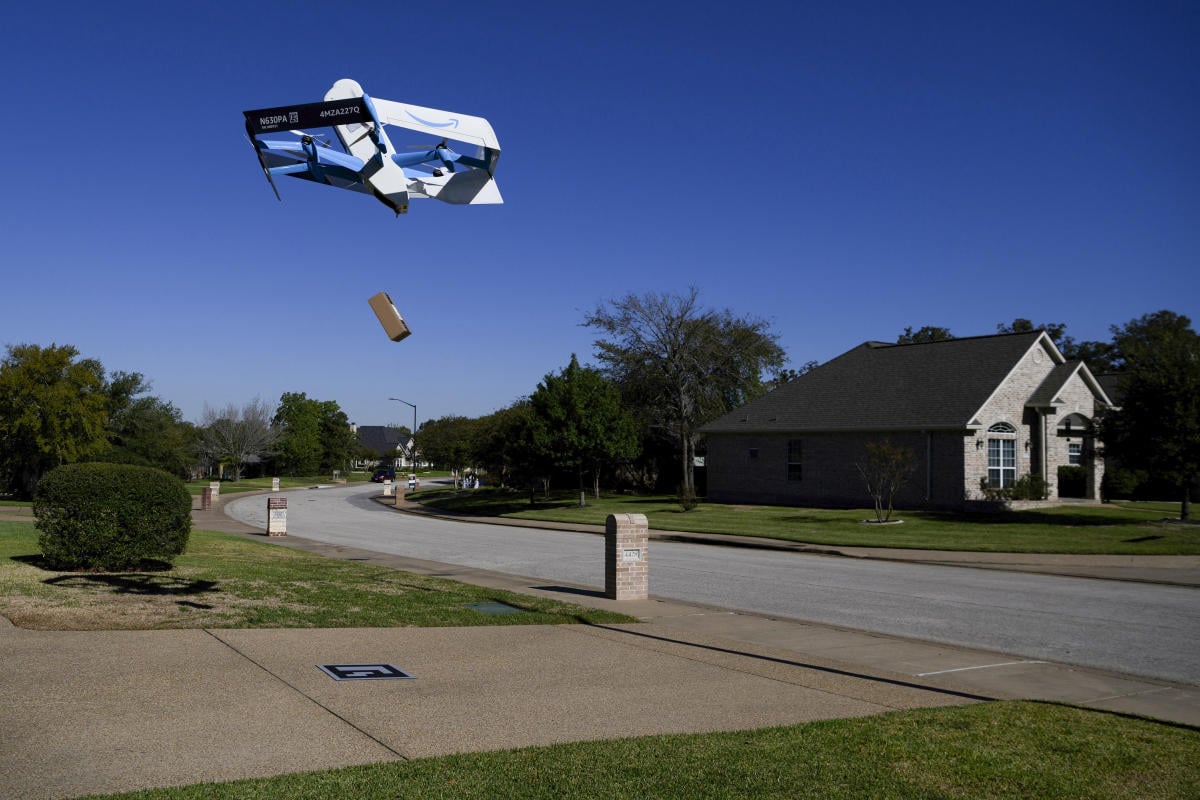Only one item can be delivered at a time. It can’t weigh more than 5 pounds. It can’t be too big. It can’t be something breakable, since the drone drops it from 12 feet. The drones can’t fly when it is too hot or too windy or too rainy.
You need to be home to put out the landing target and to make sure that a porch pirate doesn’t make off with your item or that it doesn’t roll into the street (which happened once to Lord and Silverman). But your car can’t be in the driveway. Letting the drone land in the backyard would avoid some of these problems, but not if there are trees.
Amazon has also warned customers that drone delivery is unavailable during periods of high demand for drone delivery.
As someone who frequently orders one can of soup, this is excellent news.
Dropping a can of soup 12ft onto a driveway seems bad for the can and for the driveway.
Self-opening soup can
Just give it a tiny parachute
Operation Gumbo Drop
It’ll be in Amazon packaging.
Can of soup wrapped in a brown cardstock bag 👍🏼
I’m pretty sure a twelve foot drop onto concrete isn’t good for a can of soup. Maybe it’d work for a T-shirt?
Or a beer… As long as it’s Lite Beer!
As long as you don’t leave your car in the driveway.
People buy clothes off of Amazon?
man killed by falling soup can which he ordered on Amazon
For those of us who order one can of beer, please wish us luck when we go to open it
deleted by creator
Reminds me of an insurance company that wanted to use drones to survey roof damage and in the long run they decided it was overall better to just use a camera on a long ass stick.
Just so you know, companies already use drones for roof surveys. I work for sunrun and we use them to analyze roofs for solar installations and whether roofs need to be fixed before hand.
Yeah this sounds like a great use for drones- take photos of high up places that is dangerous to climb to
Aerial drones are a particularly stupid method of delivery. Delivery trucks, combined with terrestrial delivery robots are a much more versatile approach.
Delivery trucks require a human to drive. And despite the insistence otherwise, we are a long long way from any sort of automated driving system. They also operate on a 2-dimensional plane and have to navigate around a variety of structures.
Conversely, aerial automation is significantly easier since it is 3-dimensional and there are not obstacles to navigate. This also means it’s much easier to automate.
Companies like Zipline have been operating these services for many years now with great success.
Delivery trucks require a human to drive.
Ok… and? How is that a problem that needs solving?
Humans are expensive and error-prone.
Weird, they seem to have done just fine delivering things for centuries now…
And they did just fine plowing up fields by hand.
Replacing the hand plow with the horse plow didn’t needlessly cost anyone their job.
Define “just fine”? Needless deaths and property damage are caused by human drivers all the time. I mean we could deliver things “just fine” on foot but everyone would be waiting a lot longer…
Waste of resources. A human can do other things besides drive a van around all day. We spend all this money educating people. So they can do a job a person with a 3rd grade education can do?
Been in automation a long time. Have personally witnessed the primary task of a worker being replaced by a bin.
We should encourage anything that gets rid of mindless tasks and dehumanizes workers
Ok sure, there’s limitations. So what percentage of their current deliveries are actually possible with drones? If it’s above 0%, then there’s an opportunity.
Beyond that it’s a finance/ risk/ reward/ regulation issue.
Imagine a van which drives into a suburban housing estate and instead of parking individually at different houses for 5-10 mins each, spends less than 5 mins prepping a set of drones which take off from the roof of the van and return in minutes.
It saves time and fuel. It doesn’t work everywhere, but it doesn’t need to.
In fact it could be the same van. Do deliveries exactly as normal, and use a drone for the last half mile when convenient. It’s not either/or.
The big win, I hear, is the massively rural areas;farms and cabins.
The truck can apparently launch two drones at a time, and they save time and fuel – and don’t present a driving hazard for a panel van which now needs to turn around in a potentially winding driveway. Then the truck moves on to the next stopping point when all drones are back.
deleted by creator
So if Amazon thinks they could do it themselves, and cheaper, that seems like a good reason for them to focus on it.
I still think it’s a gimmick, but them paying to outsource something is a reason to bring it in-house.
Yeah, “small and below 5 lbs” describes like 90+% of Amazon deliveries.
Meanwhile in Rwanda:
There have been 13,000 deliveries to date and it has been estimated Zipline drones distribute 65% of blood outside of the capital city, Kigali.
https://www.pharmaceutical-technology.com/news/zipline-ghana-medical-supplies-drones/?cf-view
Just because Amazon is doing a terrible job of it, doesn’t mean it’s a job that can’t be done.
Shit like that is also a far, far better use of airspace/resources
Zipline is doing some freaking amazing things!
Yeah. Personal deliveries to your home may never be a practical thing. But, Zipline shows that there is a niche for drone deliveries that’s pretty amazing.
It’s real macgyver stuff. Maybe it doesn’t fit into the cyber aesthetic, but its some pretty fucking amazing stuff. I hope more such applications get found in time.
Ok. That’s incredible. This is more what I saw for the technology’s potential. Not cutting all corners possible to make delivery of disposable goods worse.
If you’re interested there are some great videos about it.
I would like to take this time to thank the slow government FAA for preventing Amazon from clogging up the airspace with crappy drones and preventing a stupid system from taking off.
Aside from all the functional downsides, I’d expect these to go the way of Tesla when hitting a larger scale. Lawsuits and traffic incidents.
I remember people were hyped when they announced on Thanksgiving 2012 that drone delivery service was right around the corner. Brilliant marketing from them because people were hyped.
Turns out the FAA is that corner
I remember people being hyped about netting them or shooting them out of the sky.
Another more successful operation in Rwanda and Ghana is https://en.wikipedia.org/wiki/Zipline_(drone_delivery_company) delivering 1.8kg over 300km and dropped by parachute.
That works for special use cases in rural environments. They use drones for mail delivery on some German islands, for instance. As a mainstream delivery option in urban environments this is just laughably impractical and that has been very obvious from day one.
It’s certainly more useful in locations with insufficient infrastructure.
And it will keep on being a joke until, suddenly, one day it’s not.
The joke are the people that believe drone delivery won’t be a thing.
I’ll bite.
Drones are loud as fuck and if drone delivery became common there would be a massive backlash from the public. Most people live in cities and do not have a yard to put a target on lol. Drone delivery in cities is almost certainly less cost efficient than truck delivery. Land drones are much more likely in cities, or just dudes with cargo bikes like in many European cities.
So yeah drone delivery might “become a thing” but I doubt it will be mainstream.
And that’s not even getting into the point of how much easier and less illegal it is to snipe an Amazon drone out of the sky for its payload than it is to assault an Amazon delivery truck and driver. It may not be more common in the long run than porch pirates, because that’s also easy and low risk, but I 100% fully guarantee you our redneck population will be out in some capacity hunting for Christmas presents.
“In the land of the drones, the man with the t-shirt cannon is king.”
I’m not gonna lie, this had never occurred to me. But now that it has, it is 100% gonna be my hobby of the future
Bow hunting both gives the drone a sporting chance, and helps you soak in that Horizon Zero Dawn feel.
Instructions unclear, built air compressor powered blunderbuss
I’m setting up nets as we speak! Going to trawl the skies for goods
Places like Los Angeles are mostly SFH. Most areas are already loud as fuck from road noise, proximity to airports, etc. Nobody will notice a few drones.
If it becomes popular in LA, that’s pretty much definition of mainstream.
It is remarkable to me how tolerant as a society we have gotten to noise. We just accept that someone has a right to drive modified motorcycles at 3am with 8 of their buddies.
It isn’t legal (in US) and cops do occasionally set up decibel traps, especially in places frequently visited by motorcyclists, but I completely agree with you. Quiet nights outside of city feel strange now.
deleted by creator
We have Wing in Australia and gotta say getting small tech delivered or medicine by drone is very convenient. It gets lowered instead of dropped.
The drone planes in Africa delivering medical supplies are amazing.
I won’t say never, but when and how will drone delivery be more efficient than a truck?
Per package it’s more energy, it’s more risk, and the tech is harder.
To purchase a fleet of drones big enough will cost more than paying a driver for a long time still.
Pretty much everybody in this thread who is laughing at Amazon’s drones is thinking of drones as they are right now. But Amazon is not using drones because it’s a good idea now. They’re using drones now so they already have the experience and the setup when inevitable technical progress happens.
The drones might never work out or they might eventually work out, but this is exactly how Amazon got so big in the first place. They started selling books online when a lot of people still weren’t sure whether that could work and they started selling cloud computing almost ten years before anyone else thought to do that.
Fair, but the flying drone delivery in my opinion doesn’t scale up.
I think the real savings would be in something like a robot moving packages from the truck or a mobile base to the door.
Per package it’s more energy
How you figure? compared to point to point electrical energy costs compared to moving a truck mass around streets with constant stopping/starting?
It’s the same as a train, by moving bulk you reduce average costs. Plus drones have to stay in the air, and travel from their base for each package, whereas if a truck has two stops on a street it’s moving less distance.
Train isn’t doing point to point.
You’re gonna have to actually do the calculations before making claims.
Noise is absolutely a concern for flying things. The reasons we don’t yet have flying cars is not because they’re too expensive, but because they’re too loud. And this is specifically why the FAA won’t let me commute to work in an ultralight.
The police want Bladerunner spinners so bad they can taste it. And the reason they can’t have them — or more helicopters — is the noise.
That’s not the only reason why flying cars haven’t arrived. Getting a license to fly is about the price of a new car. Bad weather is no flying. Air Traffic Control can’t handle thousands of commuters. Flying cars are pretty big so parking is going to be even more of an issue.
The amount of energy required to keep something in the air instead of using the ground is also astronomically bigger
Not really. Many planes can get about 20 miles per gallon traveling at about 180 miles per hour. That’s slightly more than a family car, but not astronomically more.
The big differences are that there’s effectively no “traffic” in the air, so once you dial in a cruise speed you stay at that speed for the entire flight. In a car you can get stuck in stop-and-go traffic. There’s also the lack of “rolling resistance” in the air. Even if you’re going a steady speed on a highway your tires are a source of drag. On the other hand, taxing and taking off can burn gallons of fuel, so unless you’re going for a fairly long flight that’s a significant part of the fuel burn. Also, planes go in a straight line, whereas cars have to follow highways. But, the total fuel cost of the trip really includes the trip to/from the airports.
But, fundamentally, the fuel economy of cars and airplanes is pretty similar.
Also, imagine drunk flyers in bad weather.
Ground traffic collisions can also cause collateral damage, but more often than not those are constrained to the roads or their immediate vicinity where not many people live. An aerial collision may happen above residential areas, and even slight fender benders may mean a double crash (…on little Timmy mowing the lawn).
Also, there’s no air bag in the world that can save you in a crash.
Road traffic is easy to direct and regulate with road signs, lanes, lights, painted lines. Good luck herding cats a hundred (hundreds of) yards above ground. It’s not a huge problem with planes because there are not as many of them and they fly at vastly different altitudes. Not the case with personal flying cars.
With ground traffic, you only need two blinkers (or two sets). Some drivers even struggle with using that two properly. Good luck for getting them to use more.
And that’s just the top of my head, I’m sure there are like 2634 other reasons.
Also, imagine drunk flyers in bad weather.
I can’t imagine an “open to the general public” flying car system that didn’t involve huge amounts of automation, basically self-flying planes. A modern jet liner is effectively self-flying already. And, even though the pilots are rarely required to take direct control over the jets the alcohol limit is 0% and they’re not even allowed to drink within 8 hours of a flight. So, to have a scenario with “drunk flyers in bad weather” you’d need a system with looser rules than current aviation, and less automation that current aviation.
Also, there’s no air bag in the world that can save you in a crash.
No, but there are parachutes.
Besides, most fiction involving flying cars also involves automated flying cars. Sure, often the “hero” takes direct control of the car and does some crazy maneuvers with it, but in the futures where flying cars exist, autopilots are extremely advanced, and most commuters just hit the button and relax. In addition, if an autopilot did exist, it could become “driver assist” if the human decides to take “direct control”. So, even in a future with frustrated aerial commuters who get “sky rage” and decide to take over flying from the autopilot, a “pilot assist” program could still interpret what they want and limit the danger they pose to themselves or other craft.
The F-16 is almost 50 years old now, and for those 50 years it has been impossible for pilots to fly it with “assists off”. The plane was designed from the start to be dynamically unstable. A pilot simply couldn’t control it without computer assistance. The pilot uses a fly-by-wire system where their inputs are interpreted by computers that do the right thing while still maintaining stability and so-on. A future flying car would pretty obviously be designed the same way.
Yeah, as I was writing that, I was thinking about '80s flying car lanes. It’s like a flow of cars with constant speed. But the ‘drunk flyers’ bit meant that we are humans. You’re also not allowed to drive drunk on the roads. That doesn’t prevent people from still doing that.
Good that you’ve mentioned the F-16, I’m just watching a video on them by Real Engineering on YouTube. I can only recommend the channel, and I’m not even an engineering nerd. Well, not yet.
I haven’t watched a video on the F-16 for ages. I am just an aviation fan and have heard many stories of the F-16 over the years.
I don’t know if it’s mentioned in that video, but the early days of the F-16 were really interesting. It was the first ever fly-by-wire fighter, so there were lots of design issues to work out. The very first versions of the F-16 (maybe still the YF-16 at that stage) used a side-stick that didn’t move at all, it was designed to be pressure-sensitive so pilots could pull lightly to put a little bit of elevator pressure on, or pull hard to go to the elevators’ max deflection. The problem was that pilots never knew when they had reached the limits, so they pushed as hard as they could on the stick. Observers said that you could actually see a twitch in the control surfaces when pilots were at the max, and the twitch was due to being able to see the pulse of the pilot.
After a short time, General Dynamics switched to a side stick that had some range of motion, so that pilots knew when they were at the limits of the controls and didn’t keep pushing.
Yeah, they mentioned it in the video. That whole plane is just an awesome thing. It’s crazy how many modern sounding features they could shove into it so long ago.
As for the stick, AFAIK the pilots couldn’t tell the difference between moving it with 40% or 60% of the force needed, and the feedback loop was delayed.
I guess it’s just the timing then, because these were the main points of the video too.
They’re working on next generation air traffic control, that is automated and also can handle drones whizzing around next to flying cars, but developing that isn’t fast or cheap or deploy and will need extra equipment on the ground and in the cockpit.
The average person can barely drive without murdering someone. Flying is even more complex than that, the noise is just a small problem compqred to that.
Flying cars would almost certainly not be directly piloted. Even in movies, by the time humanity has flying cars, it has automation to handle those flying cars.
The reasons we don’t yet have flying cars is not because they’re too expensive, but because they’re too loud
I’m sure being too loud is an issue, but it’s not the issue. That’s like saying the reason we don’t all have castles is due to municipal zoning laws. Sure, that would make having a castle harder, but it’s not the issue.
Yes, “flying cars” are loud, but that’s a minor issue compared to the other ones. They’re expensive to operate. They’re dangerous both to their passengers and to people on the ground. They’re extremely expensive. The infrastructure isn’t available. They’d require training to operate, etc.
If you could wave a magic wand and make all those other problems disappear, the noise issue would still be a blocker. But, the noise issue isn’t the biggest current blocker.
We have flying cars, they are called airplanes or more specifically civil utility aircraft. You know, like the Cessna 172.
Flying vehicles aren’t more mainstream because of the cost. A new plane can cost over half a million dollars while a used plane can easily be over a hundred thousand dollars. And that’s just the cost of the plane.
The other reason is because the rules are more strict and are actually enforced. If a pilot flew their plane like the average person drives their car they would be sitting in jail await trail for attempt murder.
We have flying cars, they are called airplanes
I think you’re missing the cars part of flying cars.
Like, the dream isn’t to drive your car to the airport and get into an airplane. The “car” part of flying cars is about having one in your driveway.
A new plane can cost over half a million dollars while a used plane can easily be over a hundred thousand dollars
You can get a used Cessna for under $60k:
But, the issue isn’t the up-front cost. Because a plane isn’t a flying car, you have to store it somewhere, and that isn’t cheap. Even just tying it down outdoors can be more than $150/month. Then there are the operating costs, which are much higher than cars: insurance, annual inspections, fuel, maintenance, etc.
The Webster dictionary defines a car as a vehicle that moves on wheels which airplanes definitely are.
If you’re having to resort to the dictionary definition, you know you’re flailing.
The idea behind a flying car is that everyone could have one in their driveway (not the rare people who live in fly-in communities) and that they can use a combination of driving and flying to get places. That’s what all the flying-car companies are working towards, that’s what people dream of having. Having to live right next to an airport, or having to drive their car to the airport to get their plane isn’t the “flying car” dream.
I feel this could actually work fairly well in smaller rural/suburban communities
Maybe if they used bigger craft with larger payload capacity and longer range
And maybe that craft could have wheels instead of rotors to mitigate the rain/wind problems… i think we might be on to something here!
deleted by creator
Like a Chinook!?
Haha, now I am picturing a huge Chinook delivering the smallest package of essentially bullshit to my door.
Yeah, I am totally behind that idea.
Or one of the ch54 skycranes delivering a shipping container of amazon returns to the auction winners.
The problem is that the bigger and heavier the craft the higher it’s minimum drop height is going to be because it’s more dangerous and needs more clearance.
Obviously it also becomes much more costly to run.
Put a little parachute on the package to soften the fall! /s
That made me laugh… I was imagining a small parachute hooked up to a plasma TV 😲
not even necessary a bigger capacity I mean it being just able to bring me like a bag of chips or something I forgot for dinner would be great
While people will undoubtedly take the piss, for a number of reasons, it’s less energy expenditure / lower footprint than you getting in your car/truck and going to the store and getting them yourself.
If you factor in all the logistics and systems necessary to run the drone operations and all associated functions, is it likely to be much of a saving?
I could see something like this as useful for medical prescription delivery, but that comes with its own issues and dangers.
Yeah, almost definitely. Even if those systems have a relatively high power draw, they’re still not being powered by a low efficiency ice engine but are being powered by a grid that’s only getting greener. Also factor in the fact that a car+person is minimum about 1100kg that needs to be transported as opposed to the low weight items plus the weight of the drone (can’t be more than 2-3 kg)
Would it be less energy expenditure than a delivery van making multiple stops on its way to deliver you your bag of chips?
That’s where range issues pop up.
And poachers perhaps
I’m just sitting here thinking personal home delivery maybe isn’t the most sustainable thing in the world.
Perhaps we could invest the massive amounts of money that it takes to deliver goods to homes into better transit and post offices that don’t look like crap.
We’ve had mail delivery for what, 200 years? We used to have (and some places still do) have milk and vegetable deliveries. It’s not even that expensive.
I had diaper pickup and laundry service a few years ago, which was amazing. Well worth the $.
Hyperloop 2.0.
Delivering something by air is the least efficient way to do so, unless it’s Avdiivka and you deliver a grenade. Yeah, making them now is cheap (and we overproduce these unrecycleable toys), but what the upsides of using them instead of, like, land drones, or human workers, or some rail-system? It’s cool and fancy the first time you order it, but what’s the reason behind it other than our entertainment? Why not to make a delivery guy shoot fireworks once they are here - as enjoyable, and as chinese as these drones.
Why we want to produce this junk in the first place? And aren’t we afraid this shit records close-ups of each property itflies over?
There are places delivery with drones makes a lot of sense and is the best way to do it. It depends what the most important metric is.
In an African country they are delivering medicin and bloodbaths with a drone plane to hospitals that need them for emergencys. That way they only need to have one central stock of these supply’s that can be quickly dispatched. Driving wouldn’t be an option that would take several hours over bad roads. Veritasium did a video about it.
For Amazon deliveries it makes no sense at all.
bloodbaths
bloodbags?
Unless they crash when delivering them
I agree with you.
I’ve mentioned ukrainian Avdiivka, a battlefield, that isn’t accesible by usual means (and where aerial drones can launch a surprise attack).
The same goes to places with destructed or underdeveloped infrastructure.
Drones can be used in the least accesible places. But they ate tested in places that are already covered by drivers.
I disagree with you with the efficiency comment. In an ideal scenario, deliver by air can be super efficient. No road obstacles, shortest path trajectories, hell, the sky is 3D!
It’s been tried before: messenger pigeons.
It can be efficient, but the major pro-land point is: what would it do having 0 fuel?
A car would stop, a drone would drop.
It’s an exception and no one would pilot a drone to it’s exhaustion, but either way holding it in the air is a costy investment.
How do robo-taxis or electric bikes for rent deal with the fuel problem? It’s an already solved issue.
However, you do have a point with malfunctions.
Those don’t tend to fall out of the sky when they run out of power.
Understood, but then robotaxis have run over people without the need of flying.
E-bikes and e-scooters are better, but I haven’t personally seen an infrastructure to use them unless they are personally owned and recharged at home. Are there stations for them in the US?
Robo-taxis though are their own can of worms. Discussion about their capabilities can take days.
deleted by creator
The first thing you mentioned has nothing to do with fuel, which was OP’s original argument.
As for the second thing, I’ve already said I agreed with OP.
deleted by creator
It’s obvious that autonomous drones are more difficult to create than they seem… I think delivery robots that go on the ground are much safer and more feasible. They can carry heavier packages, they are less dangerous and can travel at less dangerous speeds.
… and they can get robbed or kicked, their sensors sprayed shut… and repair costs a fortune. I don’t think delivery without a human makes much sense, maybe except for a drone that delivers to the Australian outback or a small island at the German coast.
They want desperately to cut delivery cost by taking out the human they have to pay for it to do the work. To do so they spent billions they could have used to pay these people a decent wage and hire more of them. It is dumb.
Don’t those same issues apply to humans though? You can beat up or kill a human delivery driver and take everything in the truck just as easily as you could with a hypothetical robot.
This is very true, but every porch pirate isn’t a moral free tweaker willing to do whatever it takes to score. I think the average down on their luck schmuck would have fewer qualms vandalizing an automated delivery system.
I am from Germany, our crime rate is very, very low. I doubt that many people here would think beating up or even killing a person is “as easy” as doing it to a funny looking delivery robot. Depending where you are from, that might be different though. If you live in a place where people actually see no difference between both and do one as easily as the other, than please stay safe!
There are ways to prevent that, like alarms, notifying the police. These robots will absolutely have ways to be tracked at all times, cameras and all. You could also only use them for low value packages, so the effort is less worth it.
And use less energy since they don’t have to fight gravity
It will be good for things like medications, small electronics, and basic kitchen supplies.
I’m not sure I’d want my small electronics dropped onto tarmac from 12 feet up. I don’t care how much bubble wrap you use, that does not sound ideal.
Best for medications as you said.
just yeet the knife
If I’m honest it really is not at all surprising.


























